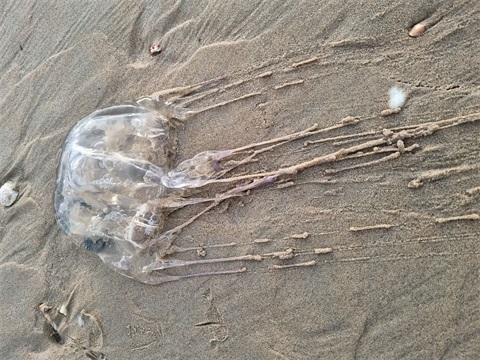Potentially lethal Box Jellyfish prompt Cable Beach warning
Published on 18 January 2023

The Shire has issued warnings along Cable Beach and Gantheaume Beach after potentially lethal Box Jellyfish were found washed up just days after a surfer was stung by an Irukandji Jellyfish.
Less dangerous but painful Blue bottles (or Portuguese Manowar) have also washed up in recent times.
The Box Jellyfish is the most dangerous of the three. If someone is stung by one:
1) Call 000
(2) Treat the patient - CPR if necessary (Box Jellyfish stings can cause respiratory and cardiac arrest within a few minutes).
(3) Neutralise the sting and douse the sting with vinegar - do not use freshwater or alcohol or urine.
(4) Transport to medical aid (hospital) The priority treatment for these types of stings is to save the victim's life, treating their pain is secondary. Box Jellyfish stings may require powerful narcotics for pain, as well as hospitalisation.
With Box Jellyfish stings, there will usually be long lengths of tentacles that can be clearly seen on the skin and look like whip marks also associated with severe pain. Once they are doused with vinegar the tentacles can be removed with gloves - only use vinegar on Box and Irukandji jellyfish, not Blue Bottles.
Shire of Broome president Harold Tracey said community safety was a priority.
“We encourage everyone to always be cautious when swimming, fishing and launching boats, especially in wet season,” he said.
“When there is a beach closure please abide by the no swimming rule and look for and follow all beach signage.
“Please don’t become complacent around waterways. Irukandji, crocodiles and sharks are most definitely there, and we need to be vigilant.
“My final message is let’s all stay aware and keep ourselves safe.”
The warnings will be in place for at least three days, but the Shire urges people to consider the risks until the stinger season ends in May.
Other precautions you can take include:
- Wearing protective clothing when swimming, especially during the stinger season (November - May). A full-length Lycra suit or wetsuit reduces the risk of stings by 75 per cent. When launching boats, ensure all areas exposed to the water are covered.
- Do not swim during beach closures and avoid swimming when waring are in place.
- Look for, and follow all beach warning signs.
- Carry vinegar. When you go swimming, boating, fishing or cast netting; vinegar is provided at some beaches.
For more information on stingers and treatments, visit our Tropical Marine Jellyfish page.